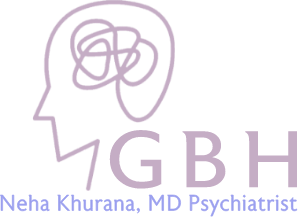Bipolar Disorder Treatment and Therapies in Norcross, GA
Expert Bipolar Disorder Medication in Norcross
Understanding Bipolar Disorder
Bipolar Disorder is a mental health condition that causes significant shifts in mood, energy, and activity levels. Individuals with this condition experience periods of extreme highs (mania or hypomania) and lows (depression). These episodes can impact daily functioning, relationships, and overall well-being.
At Georgia Behavioral Health, we specialize in providing comprehensive care for individuals in Norcross, Suwanee, Atlanta, and surrounding communities, with bipolar disorder treatment and therapies. Our evidence-based treatments and compassionate team of therapists are dedicated to helping you find balance and regain control of your life.
Signs and Symptoms of Bipolar Disorder
Symptoms of bipolar disorder vary based on the type of episode—manic, hypomanic, or depressive. Common symptoms include:
Manic or Hypomanic Episodes:
- Increased energy or restlessness
- Racing thoughts and rapid speech
- Reduced need for sleep
- Impulsivity and risky behavior
- Unrealistic feelings of euphoria or grandiosity
Depressive Episodes:
- Persistent sadness or hopelessness
- Fatigue or low energy
- Difficulty concentrating or making decisions
- Changes in appetite or sleep patterns
- Thoughts of self-harm or suicide
Types of Bipolar Disorder
- Bipolar I Disorder: Characterized by manic episodes lasting at least seven days or requiring hospitalization, often alternating with depressive episodes.
- Bipolar II Disorder: Defined by hypomanic episodes (less severe than mania) and more frequent depressive episodes.
- Cyclothymic Disorder: Involves chronic mood fluctuations that don’t meet the criteria for full mania or depression but still cause distress.
- Other Specified and Unspecified Bipolar Disorders: Includes bipolar conditions that don’t fit the above categories but still involve significant mood instability.
Treatment for Bipolar Disorder
Managing bipolar disorder involves a combination of treatments tailored to each individual’s needs. At Georgia Behavioral Health, we offer:
- Medication Management: Mood stabilizers, antipsychotics, and antidepressants to regulate mood swings.
- Psychotherapy: Evidence-based therapies like Cognitive Behavioral Therapy (CBT) and Dialectical Behavior Therapy (DBT) to develop coping strategies.
- Lifestyle Changes: Guidance on establishing routines, improving sleep, and managing stress.
- Family Support and Education: Helping loved ones understand and support your treatment plan.
Why Choose Our Bipolar Disorder Therapists in Georgia?
At Georgia Behavioral Health, we are committed to empowering individuals with bipolar disorder through personalized, compassionate care. Our team of experts will work with you to create a treatment plan that addresses your unique needs and helps you achieve stability and wellness.
FAQs About Bipolar Disorder
What is bipolar disorder?
Bipolar disorder is a mental health condition that causes intense mood swings, including emotional highs (mania or hypomania) and lows (depression). These episodes can impact energy, behavior, and daily functioning.
What are the main types of bipolar disorder?
The three main types are:
- Bipolar I Disorder: Involves at least one manic episode, often followed by depressive episodes.
- Bipolar II Disorder: Characterized by hypomanic episodes (less intense than mania) and depressive episodes.
- Cyclothymic Disorder: Involves chronic mood fluctuations that don’t meet the criteria for full mania or depression.
What causes bipolar disorder?
- Genetics: Family history increases risk.
- Brain structure and function: Differences in the brain may play a role.
- Environmental factors: Stress, trauma, or significant life changes can trigger episodes.
How is bipolar disorder diagnosed?
- Discussion of symptoms and personal history.
- Mental health assessments.
- Ruling out other conditions through physical exams or lab tests.
Can bipolar disorder be cured?
What are the symptoms of a manic episode?
- Increased energy or activity levels.
- Decreased need for sleep.
- Racing thoughts and rapid speech.
- Risky or impulsive behaviors.
- Overconfidence or feelings of euphoria.
What are the symptoms of a depressive episode?
- Persistent feelings of sadness or hopelessness.
- Fatigue or low energy.
- Changes in appetite or sleep patterns.
- Difficulty concentrating or making decisions.
- Thoughts of self-harm or suicide.
What treatments are available for bipolar disorder?
- Medication: Mood stabilizers, antipsychotics, or antidepressants.
- Therapy: Cognitive Behavioral Therapy (CBT) and other evidence-based approaches.
- Lifestyle changes: Regular routines, stress management, and healthy habits.
How can I support a loved one with bipolar disorder?
- Encouraging them to seek professional treatment.
- Being patient and understanding during mood episodes.
- Learning about the condition to better empathize.
- Helping them stick to their treatment plan.
